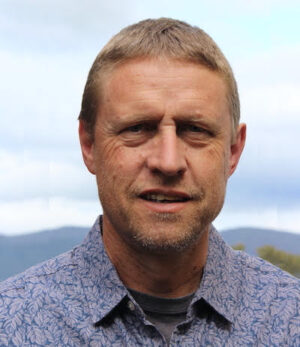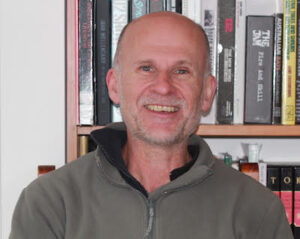Back to the Indie Corner series
I was happy to meet Ian Boyd and Gary Luck by way of their new children’s novel Melody Finch, a story about the hardships of drought in Australia’s Murray Darling Basin river system, as seen through the eyes of its native wildlife.

Ian Boyd’s previous career as a gardener and landscape designer instilled in him a passion for everything outside beneath the sun. His strange obsession for seeing life through an animal’s eyes began with a copy of Watership Down, which sat on his bedside table through much of his youth.

Gary Luck is a wildlife ecologist with nearly thirty years experience studying Australian native animals. He and partner Gayle now own a farm in Tasmania that combines forest conservation with sustainable food production of homemade breads, jams, and fruit pastes.
Mary: Tell us about yourself–your life so far and how you got started in writing. Have you published anything before Melody Finch?
Gary: Once upon a time, I was a Professor of Ecology and Interdisciplinary Science. I then decided to buy a hobby farm and become a steward of an endangered forest. I started writing when I was 15 years old. Then life got in the way, and I didn’t come back to it until into my 40s. I’ve always wanted to be a writer, but I needed to make a living some other way. Before Melody Finch I published about 150 science papers, book chapters, and magazine articles and edited a non-fiction book. I’ve also recently published my first adult fantasy novel, When Darkness Descends.
Ian: I’ve flipped between careers, including twelve years in hardware stores, two years as a children’s entertainer, five as a gardener, and ten running my own landscaping business. I studied music technology for a year and spent most of my adult life writing and recording songs for the love of it, but never felt inclined to become part of the music industry, which seemed too hard to juggle with kids. I started writing short stories in my late forties and ended up self-publishing a difficult-to-categorise novel titled Madilla: The Spirit of U’Katang, which I am considering adapting for middle grade.
Mary: Tell us something about your newest novel. Who is the intended audience, and what’s going on in the story?
Authors: Melody Finch is aimed at 8-12 year-old readers. The story addresses drought along Australia’s major river system, the Murray Darling Basin, as seen through the eyes of its native wildlife. When 12-year-old Melody Klomp turns into a diamond firetail finch, she begins an amazing journey from Queensland to the Coorong in South Australia, on an urgent mission to stop her grandmother from selling her beloved tour boat, The Isabella. Along the way, she meets many wonderful birds, frogs, seals, and a platypus. At the Coorong, Melody and an army of her new bird friends battle a greedy net fisherman and his pet osprey, Silverclaw, who are threatening all animal life in the region.
Mary: What sorts of ecological themes does your novel have, and how were you inspired to write about them?
Authors: Melody Finch covers themes such as climate change, drought, species migration, introduced species, translocations, wildlife-human conflict and water management. Whew! That seems like a lot, but it’s all integrated into a fun and adventurous story. We were inspired by the environmental challenges that the world is currently facing.
Mary: After publication, did you do any book fairs or talks? How would you describe the reaction to your book? Is it hard to market during the coronavirus?
Authors: Coronavirus has made visiting schools very tough, so most of our marketing has been done online including a short video we made to appeal to kids. Middle grade is certainly difficult in that authors must appeal to teachers and parents first before the kids get a look in, but the reaction has been great, especially for a self-published book without the marketing clout of major publishing houses. Melody Finch has gotten very positive reviews on Goodreads and NetGalley, and it has been well received at various schools and achieved the endorsement of the local Children’s Book Council of Australia.
Mary: Congratulations! Are you working on anything else right now, and do you want to add other thoughts about your book?
Authors: We’re working on a follow-up to Melody Finch, The Last Firedog, which is about the challenges of wildfires in Tasmania and also managing a nasty disease called Devil Facial Tumour Disease, which is an infectious cancer that attacks Tasmanian Devils. The main character, Reynold, turns into a Tassie devil and escapes a wildfire, which forces him to venture into the mountains with all the other animals. We plan on following up again with another story in the same style addressing floods.
Mary: Thanks so much for your wonderful insight into Melody Finch. I’m looking forward to more!